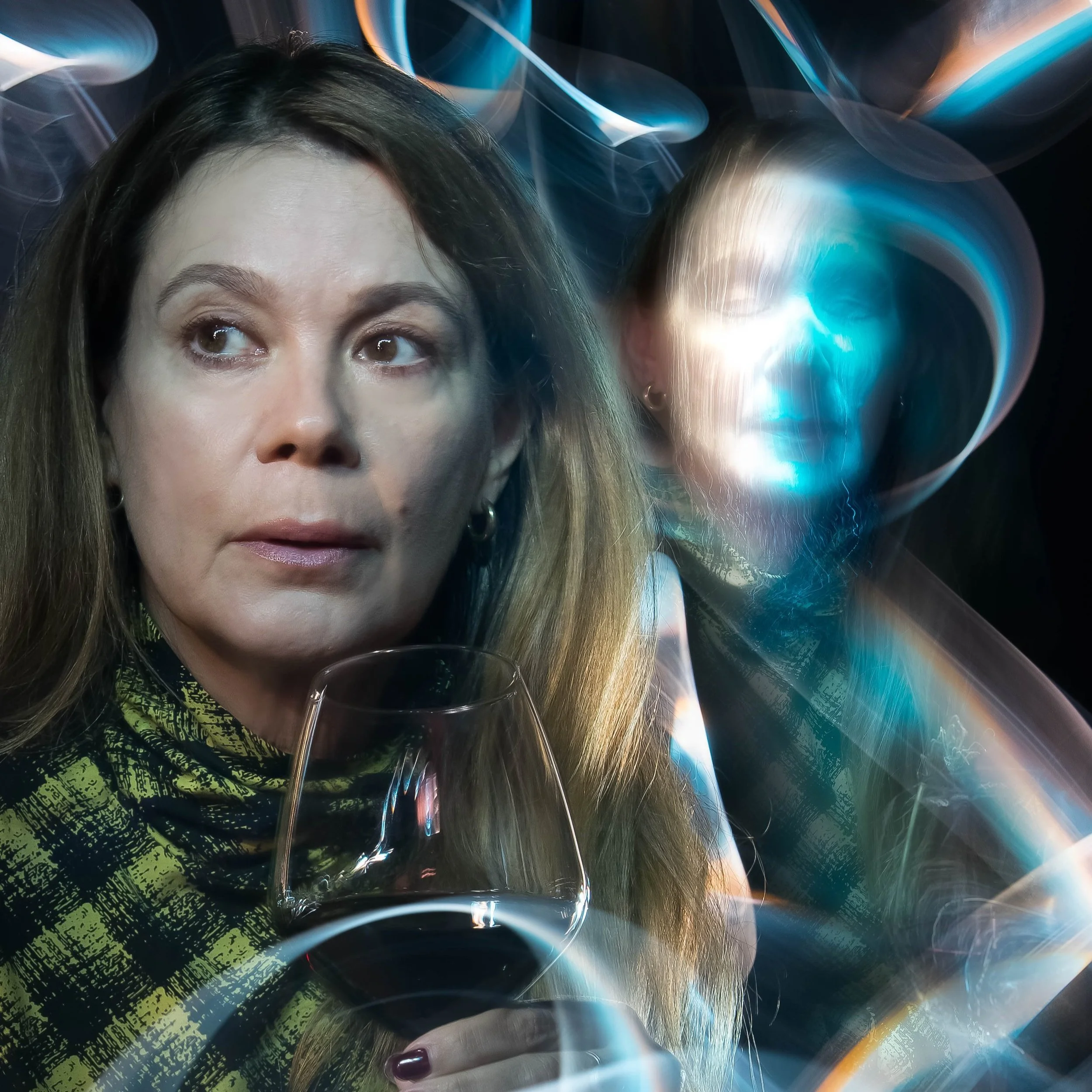Ominous Sounds at the River Crossing wrestles with race, generational divides, and opportunity in theatre
Touchstone Theatre director Roy Surette says conversation-starting world premiere questions who has the right to tell which stories
Kerry Sandomirsky in Ominous Sounds at the River Crossing; or, Another Fucking Dinner Party Play. Photo by David Cooper
Touchstone Theatre presents Ominous Sounds at the River Crossing; or, Another Fucking Dinner Party Play at Performance Works and via livestream until March 13
IT’S A TOPIC the theatre community has been wrestling with throughout these times of racial reckoning and pandemic shifts: Who has the right to tell which stories? And when should people share the space onstage—or simply just step aside and let new voices take the spotlight?
Touchstone Theatre is about to present the world premiere of a work by Canadian playwright Jason Sherman that tackles those sticky questions and more. Titled Ominous Sounds at the River Crossing; or, Another Fucking Dinner Party Play, it centres around six actors staging the titular, tired “dinner-party play”, and wrestling with questions of appropriation and privilege.
“As soon as I read it, I said, ‘Oh my god, this play is great!’” veteran director Roy Surette tells Stir of reading the first draft just before COVID hit the world. “It was kind of a little mind-bending and it was a bit hard to know where it was going to land at times, but I loved the conversations.
“As someone who's worked in theatre for a long time and had lots and lots of opportunities, it felt very timely in terms of the things we’re trying to bring into our process—and the fact that, with other generations, some are saying ‘Go away,’ some are saying ‘Give us the space,’ and some are saying, ‘Come share the table.’ All of those conversations are part of this play.”
Surette would see several more drafts and Zoom readings over the ensuing year and a half, working closely, via the interweb, with the Toronto playwright, whose Patience Surette had directed at Victoria’s Belfry Theatre in 2000. In many ways, Surette adds with a laugh, the project got him through the pandemic.
Initially, the play focused almost exclusively on the generational divide in the theatre world. In Ominous Sounds, a “woke” younger cast member interrupts the older actors to tell them they don’t have enough personal connections to certain stories to perform in them, and yearns for plays that tackle bigger, more urgent issues.
“After a fairly major rewrite, we incorporated two artists of colour into the project. And although they play lots of different parts, they’re racialized females and that has resonance,” Surette explains.
Sherman has assigned the characters not names, but numbers, one through six—a choice that has forced the director and his cast to question the way roles are assigned. “And he doesn't say who plays what in the play within the play,” Surette adds. “That was kind of mind-blowing, because we had to have these conversations about, ‘How do we refer to each other? Do we call each other ‘him’ or ‘her’? Is this an older male? A younger female? A trans person?’”
In the end, Surette assembled a strong, culture-crossing, generation-spanning cast: Kerry Sandomirsky, Monice Peter, Alex Poch-Goldin, Allan Morgan, Nicola Lipman and Angela Chu. “We have actors in the play that are ages from 25 to 70 and everything in between,” he says. Some of the older actors within the world of the play speak about how they miss acting in old costume and historical dramas—works that acclaimed actors like Lipman, Morgan, and Sandomirsky know well in real life.
Expect a meta-theatrical experience that Surette likens to The Twilight Zone meets Bertolt Brecht, with a bit of Sartre thrown in—the audience’s gaze a part of the experience. “It’s fair to say we are witnessing something and they are aware we are witnessing it,” Surette hints. “But is it an open rehearsal and we’re guests, or what is going on?”
Touchstone Theatre artistic director Roy Surette
The smart, sly script has made everyone involved re-examine their place in theatre in a new way—including its director.
“I’ve said so many times, ‘I feel so lucky that I’ve had so many opportunities.’ And, yes, COVID’s been so crappy and challenging,” he explains. “But I’ve directed hundreds of plays. And as much as I’ve been in the room and said, ‘I don't ever want to stop this,’ I can appreciate that we have to share the table and make room. The question is, does that mean stepping aside or does it mean stepping back? I'm in my mid 60s and, of course, I'm asking that, and everyone I know is asking those questions.”
Audience members are likely to find themselves asking similar questions.
“I feel there's a lot of long-time theatregoers that might say, ‘Oh yes, this is speaking to me, and I don't want to lose some of those wonderful things that made me fall in love with the theatre 30 years ago.' But at the same time we know we want to open the door and bring new people into the theatre, both as participants and audiences,” Surette says. “I think the play encourages that but also talks about the challenges of sharing.”














